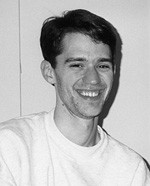Kevin Travers ’95 Cell Research Targets Cancer Mysteries
Open gallery

Scientists agree that curing cancer involves unlocking the complexities of the cell, and Kevin Travers is on a team that might have its fingers on that elusive key.
“Kevin’s work is a hot field in the study of nucleic acids,” says Louis Kuo, associate professor of chemistry and department chair. “It has major implications for the field of biochemistry itself, and possible applications for the design of better anticancer and antibiotic drugs.”
In Stanford University’s biochemistry department, Travers is conducting postdoctoral research on the behavior of certain cellular molecules that are instrumental in transferring information within the cell as it carries out its basic functions, including growth, expansion, multiplication, and division. Specifically, Travers is studying how RNA molecules transform themselves in a process known as folding.
“The main focus of our work is to try to better understand the chemistry of these molecules,” says Travers. “We consider the forces that drive them, and down the line, that information may be used to see how specific drugs can better bind to them and inhibit their activity.”
Travers, who double-majored in biochemistry and mathematics, credits his undergraduate research opportunities with helping him choose a career path. “I got a very broad exposure to the sciences at Lewis & Clark,” says Travers, who places significant value on his summer research with Kuo. “It was certainly my introduction to the possibilities of nucleic acids and what they can do,” he says.
The summer research they conducted on modified nucleic acid molecules in 1992 and 1993 had significant value and was subsequently published in an international peer-reviewed journal, Nucleosides and Nucleotides.
“He was working with me on the synthesis of analogs of DNA, which could be used to alter a subunit of DNA, the blueprint of all living things,” says Kuo. “It is quite unusual for an undergraduate to be published in a peer-reviewed journal that contains the work of mainly PhD scientists.”
Understandably, Kuo describes Travers as one of Lewis & Clark’s star students. “He is definitely brilliant. He has what one faculty member here referred to as an ‘enviable intellect.’”
Travers’ personal life is also intertwined with the legacy of Lewis & Clark. He lives in Palo Alto with his wife, Amy McDonnell Travers ’92, who majored in psychology and now works in speech and education therapy. His father, Jim Travers ’84, double-majored in English and psychology.
—by Dee Anne Finken
More L&C Magazine Stories
Lewis & Clark Magazine is located in McAfee on the Undergraduate Campus.
MSC: 19
email magazine@lclark.edu
voice 503-768-7970
fax 503-768-7969
The L&C Magazine staff welcomes letters and emails from readers about topics covered in the magazine. Correspondence must include your name and location and may be edited.
Lewis & Clark Magazine
Lewis & Clark
615 S. Palatine Hill Road MSC 19
Portland OR 97219

